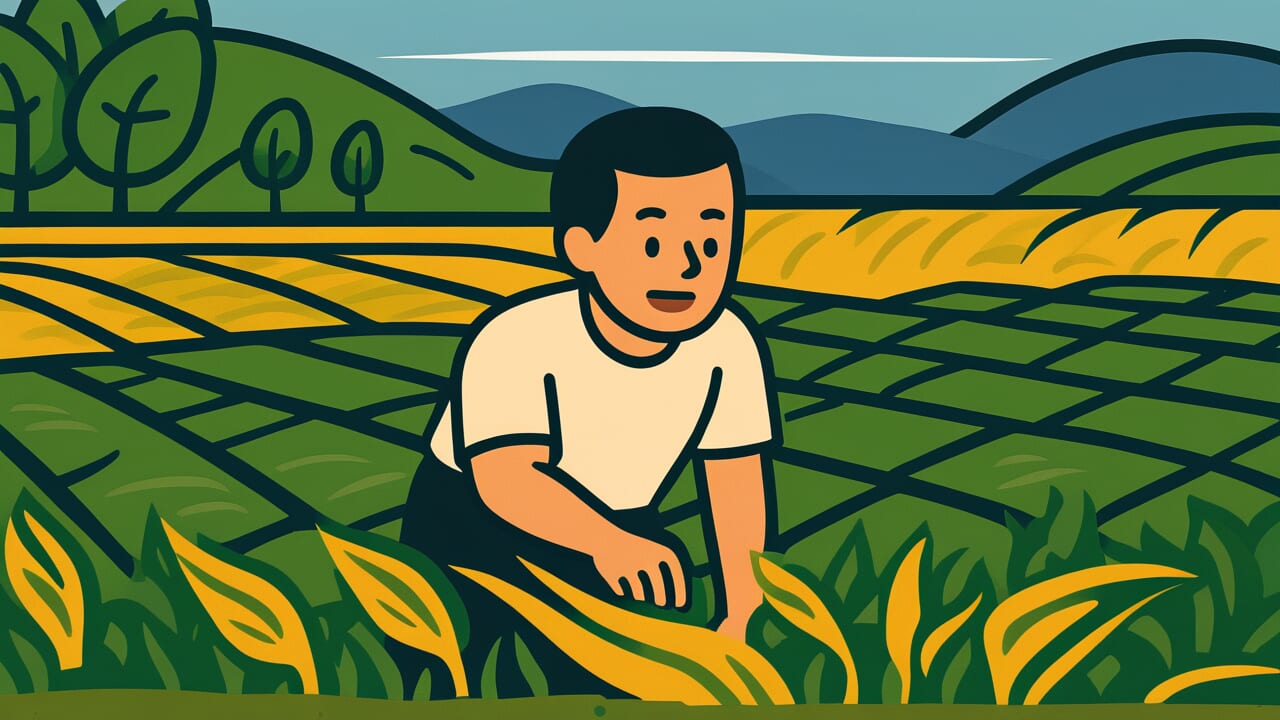How to Read “If you work the rice field, the vegetable field gets neglected”
Ta no koto sureba hatake ga areru
Meaning of “If you work the rice field, the vegetable field gets neglected”
This proverb shows the limits of human ability. When you focus on one thing, other things get neglected.
We cannot do multiple things perfectly at the same time. If you throw yourself into work, family life suffers. If you immerse yourself in hobbies, your main job gets neglected.
This is not about being lazy. It happens naturally because time and energy are limited.
This proverb can warn someone who is too focused on one thing. It can also point out situations where balance is lost. You can use it to reflect on your own situation too.
Dedicating yourself to one thing is wonderful. But this saying reminds you to pause and think. Are you losing other important things as a result?
Origin and Etymology
The exact origin of this proverb in written records is unclear. It likely emerged from practical wisdom in Japanese farming communities.
Rice paddies and vegetable fields represent the two major crops in Japanese agriculture: rice and vegetables. Both were crucial income sources for farmers and the foundation of their livelihood.
However, if you devoted yourself to rice paddy work, the vegetable field would not get proper care. Rice cultivation involves detailed tasks: planting seedlings, managing water levels, and pulling weeds.
During this time, weeds would grow wild in the vegetable field. Pests would appear. Crops might even wither and die.
This problem was serious because of farming’s nature. Agricultural work has proper timing. Missing that timing greatly affects the harvest.
Both rice paddies and vegetable fields have specific moments when they need attention. Focus too much on one, and the other will definitely deteriorate.
Farmers who witnessed this reality firsthand likely created this proverb from their experience.
For people living in farming villages, this was not just a metaphor. It was an urgent problem they felt in daily life.
Usage Examples
- We put too much effort into the new business. If you work the rice field, the vegetable field gets neglected—our follow-up with existing customers became inadequate.
- I only studied for the certification exam. If you work the rice field, the vegetable field gets neglected—I ended up with no time at all for my family.
Universal Wisdom
This proverb has been passed down because it addresses a fundamental human dilemma. We are creatures who constantly seek “more.”
Better results, higher recognition, greater success. That ambition is wonderful. But we also face an absolute constraint: time.
Human sadness lies in our psychology of not wanting to admit our limits. We convince ourselves we can do everything. The result? Everything becomes half-finished.
Or we focus too much on one thing. By the time we notice, other precious things have been lost. Perhaps this repetition is what life is.
However, our ancestors teach us through this proverb about the danger of seeking perfection. You cannot have everything. Gain something, lose something.
This is not pessimistic resignation. It is wisdom based on facing reality.
What matters is identifying what is truly important to you. Do you choose the rice field or the vegetable field? Or do you keep both moderately maintained?
That choice shapes your life. You do not need to be perfect. Just take responsibility for your choices. Live while understanding that you will lose something.
Perhaps that is what it means to live as a human being.
When AI Hears This
The second law of thermodynamics is an iron rule of the universe: “If left alone, things always become disordered.” Do not clean your room, it gets messy. Machines always deteriorate.
This happens everywhere in nature. Entropy, or disorder, keeps increasing.
The essence of this proverb is that human effort as energy is a “zero-sum game.” Put 100 units of effort into the rice field, and zero units remain for the vegetable field.
Then in the vegetable field, weeds grow, soil hardens, and pests multiply. This is exactly entropy increasing.
Farmland is originally an artificial system that maintains a “low-entropy state”—an orderly state—through continuous human energy input. The moment that maintenance energy stops, nature mercilessly moves toward disorder.
What is interesting is that this deterioration rate is not constant. In physics, there is a concept called “entropy production rate.”
A neglected field deteriorates exponentially. If it deteriorates 10 percent in the first week, then 15 percent the next week, then 20 percent after that—it accelerates.
In other words, while you concentrate on the rice field, the vegetable field’s decay becomes irreversible over time.
This proverb teaches that human activities are a battle against physical laws. And that battle always has limits.
Lessons for Today
This proverb teaches you the importance of making choices. You do not need to do everything perfectly. Rather, that is impossible.
What is most important to you right now? Is it your career, your family, or your own personal growth? The answer differs for each person and changes depending on the time.
What matters is choosing consciously for yourself.
If you focus on something, something else gets neglected. That is not failure. It is the result of choice. You do not need to feel guilty.
However, you do need to stop regularly and review your choices. Right now, you are focusing on the rice field. But is it really okay if the vegetable field gets neglected?
Take time to ask yourself this question.
No perfect life exists. But you can make choices based on your values and take responsibility for those choices.
That is the most honest way to live for those of us with limited time.



Comments